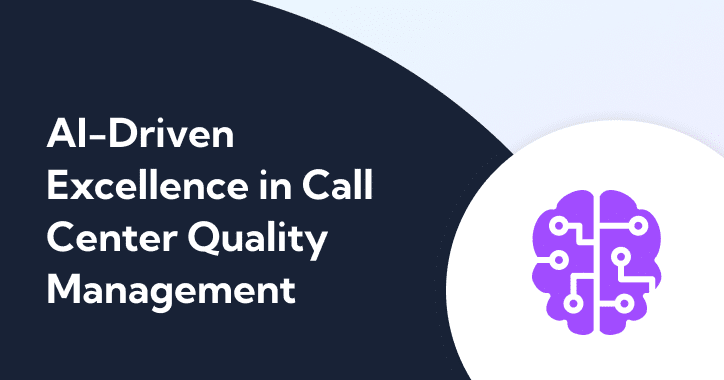So you want to be a better call center coach. Your ability to operate a successful call center depends on how well you coach your agents. It takes more than a knack for giving motivational speeches or writing call center scripts. You need to coach the specifics of landing a sales pitch, troubleshooting technical issues, or fielding complaints from upset consumers. You also need to make consumer contact as fun and impactful as possible.
Ready to get better at coaching call center agents? Master the following tips, techniques, and strategies so that you follow call center best practices. If you can successfully implement these, you’ll be on your way to making your call center successful and as impactful as possible, while making sure your agents are satisfied. Oh, and company leadership will praise you.
How to Overcome the Biggest Obstacles to Coaching Call Center Agents
Before we get into any call center techniques, tips, or practices, you need to realize something. Like any coach, you’re up against many challenges. One of the essential parts of being a good coach is learning to recognize and overcome obstacles. We’ve identified what we think are the 4 biggest obstacles to coaching call center agents. If you’re a call center coach, you need to be familiar with these.
1. Poor Knowledge Retention
When agents face the nerve-wracking uncertainty of taking their first real calls, many forget their training. Some assessments suggest that workplace trainees will have lost 40 percent of what they learned 20 minutes later and a whopping 90 percent after one month. What are you doing to help agents retain knowledge better?
2. Time Constraints
Time isn’t always on your side when you’re coaching call center agents. Managers who have to train large teams can easily find themselves overwhelmed. Even worse, blind spots may form, which directly contributes to skill gaps among agents. Additionally, your call center is probably operating at full capacity, which leaves little time for training and coaching.
3. Big Boring Workloads
Creating a balance between coaching, training, and making the calls requires a lot of skill. Too much in one direction, and you’ll be failing your agents. On top of time, you don’t want to make the work boring. When agent workloads are boring, and there’s not enough time, you could create a situation where it’s hard to retain agents. You’ll want to make sure you cater the coaching and training to what they can handle. You’ll need the most accurate analytics and feedback you can get.
4. Difficult Learning Curves
It’s not always easy for people to adjust to the schedules of call center operations — Varying call volumes can mean that agents have to go from a laid-back pace to a swift pace at the drop of a hat. This all means it’s more difficult for many call center agents to actually pick up skills, especially for agents who have poor organization skills or find it challenging to keep consecutive tasks separate.
A Coaching System You can Implement Today
Successful call center coaching comes down to coaching that has a behavioral focus. In other words, coaching that actually changes behavior. Here’s one strategy you can use to change behavior now. It has two parts. First, teaching excellent call center skills so that they become habits. Second, systematically replacing bad habits with good ones.
Turning Great Call Center Skills into Habits
Every time you teach a new skill, help your agents build the habit by encouraging them to intentionally repeat the skill 30 times or more. To do this, create a sticky note or a reminder for agents, so they always have that skill front and center. Then, set up a Google Sheet with your agent’s names and the skill. Have your agents tally how many times they’ve used that skill every day in the Google Sheet. You’ll quickly learn what skills are actually getting used and how often you need coaching or training. This is a system the best call center coaches can use to up their game.
Replacing Bad Habits with Good Habits
Before your next coaching session, you’ll want to create a list of all the possible bad habits in your call center. Then, narrow down that list to what you think would be the most impactful to change. During your next coaching session, get feedback from your agents on what they believe the most impactful habits to change would be. Once you collect the feedback, focus on changing one habit. Follow the same method as outlined above. Create a reminder and have your agents keep track of habit changing in that same Google Sheet.
More Call Center Coaching Considerations for this Strategy:
If you can get your agents to use their training and coaching on the phone, your call center will be better off. By using the above Google Sheet strategy, you’ll be able to change behavior in no time. There are a few more call center coaching techniques you can use:
- Call center coaching technique 1: Try to help your agents better realize what they need to change. You can do that by following the grow model. The grow model lists four open-ended questions to help agents get to conclusions on their own. You can read more on the grow model here.
- Call center coaching technique 2: While you’re doing one on one coaching, try the sandwich approach. The sandwich approach in call center coaching works by pointing out one positive thing an agent did, followed by one thing to improve, and then one more positive thing.
- Call center coaching technique 3: Try using gamification by creating records of the new habit. You could see how quickly reps use the new habit 30 times or how many total habits were changed. By using competition to your advantage, coaching, training, and tracking will be more productive and fun.
If you successfully implement this process and your agents follow it, you’ll be able to change habits and behavior in no time, which is what successful coaching and training looks like.
Now, you may be thinking, your call center is too big for this, you don’t have the time, or the workflow just won’t accommodate this method. You want to make sure you know your call center structure and workflow so you can tackle its unique set of challenges. You might realize this system just won’t work.
A Better Way to Effectively Coach Your Call Center, Create Good Habits, and Get Rid of Bad Habits
Think about how sports teams coach their way to winning championships. They hire the right supporting positions, like assistants, assistants, physical trainers, and a small village of other personnel, to keep the team moving in the right direction.
You don’t necessarily need more people or upper-level managers to help with coaching call center agents. Sometimes, more bureaucracy could weigh down your organization and compromise its ability to stay agile.
You may need added support or a new framework. How can you add support and gain time? By changing your coaching framework. Look at adding some technology that lets you do more. Many call center managers are switching to A.I. that automatically coaches call center agents DURING phone calls with their tips, practices, and techniques.
With technology, you can
- Coach call center agents in real-time,
- Continue training on the job,
- Maintain standards without depending on faulty human memory, and
- View data that charts progress and business value in more transparent terms.
- Keep your team accountable.
- Better manage agent and manager time.
- Effectively change call behavior.
Call center tools that use A.I. to intelligently analyze living, breathing conversation will give you enhanced power to make smarter decisions about coaching call center agents. By putting feedback at your fingertips as well as making coaching more accessible to agents, they ensure that you can learn from your organizational mistakes and refine your professional education strategy.
Using Technology to Coach Call Center Agents
Technology can change the game for a call center. Why? Because call center coaching tools can help you go beyond your limitations, namely knowledge retention, time, workloads, and learning curves. Here are some ways to coaching your call center agents using real-time A.I., one of the most valuable call center coaching tools
1. Fight Stress
Good call center managers care about their workers’ well-being. Not just because they’re friendly people, but because improving well-being contributes to things like economic growth, better customer service, and many other advantages.
Make coaching call center agents easier on everyone. Technology can help. With the right tech, you can manage call queuing to help enforce break schedules. Technology will help you limit easily avoidable stressors that tend to leave agents feeling underappreciated and burned out.
Live call monitoring systems that coach agents in real-time give agents the tools to master stress-handling techniques on their own. For instance, learning to listen to complaints without interrupting can be a helpful way to deescalate heated calls that would typically erupt into high-tension situations. A.I. call coaching tech that gives agents suggestions on what to say and how to phrase their responses are also great at making your team members feel less lost.
2. Build Soft Skills
Soft skills, such as active listening and understanding others, make it easier for agents to connect with customers. Building soft skills has direct ROI benefits. For example, knowing how to respond appropriately makes it more likely that customers stay loyal.
Building soft skills isn’t something that call center agents can learn by copying down notes from a whiteboard or memorizing scripts. Skills like active listening are rooted in experiential knowledge that takes time and repetition to acquire.
Coaching call center agents in with real-time technology will provide gentle nudges to encourage soft skills, instead of overbearing coaching and training that’s easily forgettable. Because real-time call center coaching happens on the spot, it’s simpler to reinforce habits. Agents can observe how their actions contribute to positive outcomes and happy customers. Since many soft skills can only be mastered by breaking ingrained bad habits, this gradual approach is a less confrontational way to overcome resistance to change.
3. Accessible Help, at All Times
When most people learn to ride a bike, they want someone there to walk with them for a bit before they feel confident enough to push off and start pedaling solo. Although the risks of failure aren’t quite the same with call center agent coaching, good coaches let reps know that they always have readily available lifelines.
A.I. helps agents stay focused because they’re not worried about what might happen if things go wrong. Think about it. If an agent needs to deescalate a call and they automatically get suggestions on how to, there’s no unknown. This means your coaching and call quality monitoring is always front and center.
With A.I., agents will unnecessarily call for the help of supervisors less often. With A.I., agents will be more likely to provide accurate answers when clients inevitably ask those “gotcha” questions.
4. Performance Data
Performance data isn’t just there to tell managers who to promote and who to reprimand. Data can also keep agents motivated to perform by comparing them to their colleagues in a non-threatening, gamified way. Data and gamification are tenants of great call center coaching.
Use your A.I. call center tool to encourage healthy competition. Instead of always having to crack down in the hopes of reinforcing standards, you can let reps choose the skills they want to focus on as they try to outdo their peers in the pursuit of professional excellence.
5. Coaching Call Center Agents Shouldn’t Be Hard
Coaching call center agents is easier when you have the right tools backing you up. Whether you prefer to keep things hands-on or step back and let your team expands its skills organically, A.I. real-time call monitoring tools like Balto make it possible to implement focused, high-ROI training. A.I. is your key to better call center coaching.
Ready for Efficient Call Center Coaching?
Balto is the call center coaching tool that the best call center coaches use. Coach your call center agents in the most effective way possible. Coach all your agents automatically on every call. Get accurate feedback, data, and insights. Be the person to make your call center better for everyone. Get more information and see how Balto Real-TIme Guidance could help you today. Request your free demo now.
More resources:
- Call Center Coaching Guide: Challenges, Tips, and Solutions
- How Contact Center Size Impacts Manager Coaching Methods
- 3 Crucial Soft Skills for Contact Center Coaching and Leadership






